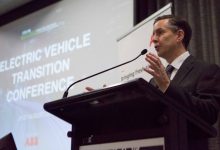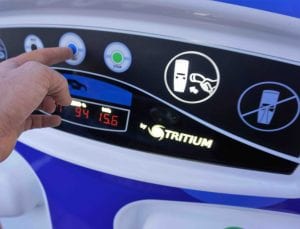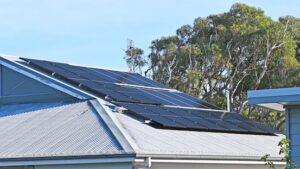Labor’s climate and energy spokesman Mark Butler says the hyperbole and the rhetoric of the hard right in media and the government means it will be a long road back for the development of a clear electric vehicle policy in Australia.
Labor went into the May election with a target of reaching a 50 per cent share for electric vehicles in new car sales by 2030, to be achieved mostly through accelerated depreciation measures for government and private fleets.
The policy, however, just like the tentative moves by the Coalition itself to discuss fuel emission standards, was shouted down by the hard right. Butler noted – in a keynote speech to the Electric Vehicle Transition conference in Sydney on Monday – that some of the arguments were so bizarre they had “jumped the shark.”
He cited Barnaby Joyce, who as transport minister nixed an inquiry into road user charges, and suggested they were so small they would be crushed by kangaroos. He noted that Barry O’Sullivan, then the chair of Senate transport committee had said he would rather “die in a ditch” than drive an EV.
Energy minister Angus Taylor, despite announcing deals for ultra-fast charging equipment, warned of the hours and days it took to charge an EV, and shared a discredited video from “Top Gear” that claimed they had no range.
Prime minister Scott Morrision said EVs were an attack on the Australian weekend, Michaela Cash had promised to “defend the tradie and the ute,” and “moderate” MP Dave Sharma compared EV policies to Soviet-style initiative, while finance minister Matthias Cormann compared the EV policy to mandating the consumption of Brusell sprouts.
The result, Butler suggested, that the Coalition’s EV policy – when it is final unveiled next year – is unlikely to include much more than technical considerations, such as standardisation of plugs and maybe a bit of infrastructure, even though the government’s own studies assume a take-up of EVs almost as fast as Labor’s plan.
However, since the election, some analysis has suggested that the uptake of EVs may not be as quick as expected, largely because of the lack of policy, the lack of availability of new models, the lack of any sort of incentives, the lack of fuel emissions standards, and the lingering concern about range and cost.
Butler suggested that – unlike for renewables – the public support for electric vehicles was not as broad, nor as deep. There is concern about cost and range and “the hard right is willing to milk that concern quite mercilessly.”
As if on cue, The Australian newspaper on Tuesday (subscription needed) published a report about emissions of EVs and the required infrastructure investment that was quickly de-bunked by the Electric Vehicle Council, which noted that the “cherry-picked data… flies in the face of the views of the Australian Department of the Environment and Energy, as well as the overwhelming weight of international research.”
“Like-for-like, EVs will beat internal combustion engine vehicles when it comes to carbon emissions every single time,” the EVC’s Behyad Jafari said.
Butler said, however, that transport emissions continued to climb, and in his home state of South Australia, where the share of renewables is already more than 50 per cent, transport emissions was now the biggest source of emissions.
“From the climate point of view, it is utterly essential that we start to drive down emissions” from the transport sector, Butler said. And also for the issue of health, fuel bills and import security.
Australia has the lowest fuel efficiency in the OECD, and modeling conducted for the Turnbull government had shown that Australian motorists paid around $500 a year more for their fuel because of the poor fuel economy.
(Hyundais’ Scott Nargar also told the conference that car manufacturers were not able to bring in fuel efficient versions of their vehicles to Australia becaue they couldn not operate with low quality Australian fuel).
Butler also pointed to the amount of sulfur in fuel from Melbourne (some of its locally produced) which was double that of Sydney, which imported the fuels). Poor air quality was responsible for more deaths than car accidents.
“We can’t seem to have a rational discussion – we can’t even talk about fuel quality,” he said, adding that $16 billion is spent on fuel imports, which was an economic drag and raised issues about fuel security. Air quality. Responsible for more deaths than accidnts.
But Butler said Australia would have no choice eventually, but to take up EVs. “We are a technology taker, particularly as Tony Abbot destroyed the car industry.
“We going to have recognize reality that global car industry has moved. Barnaby thinks we can be like Cuba and play around with our old Holden Commodores …. it’s hard to see how this government can pull themselves away from rhetoric.
“But this transiiton is unstoppable.”
Here Butler’s speech in full below.









